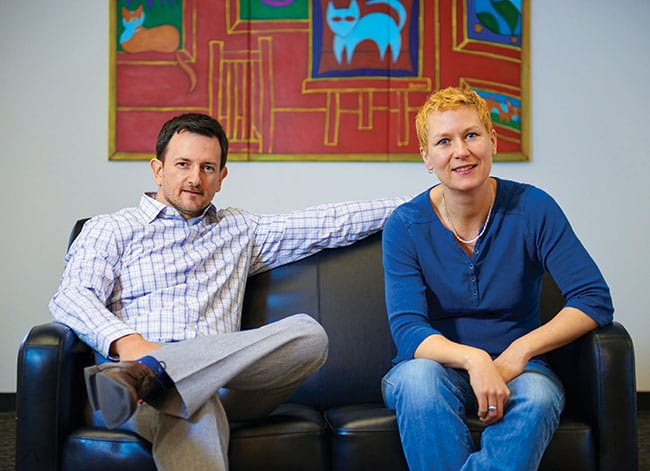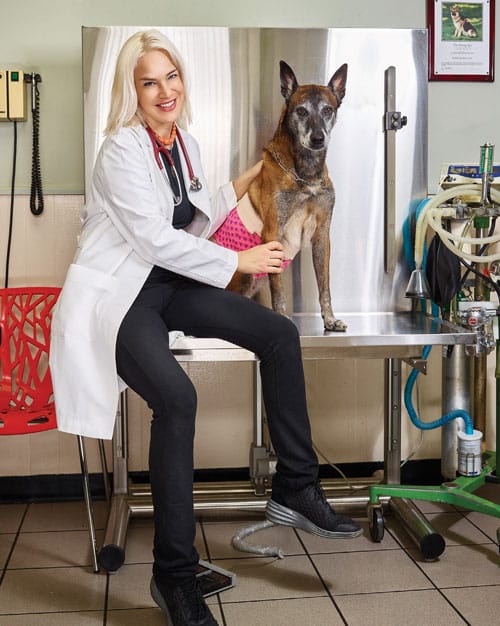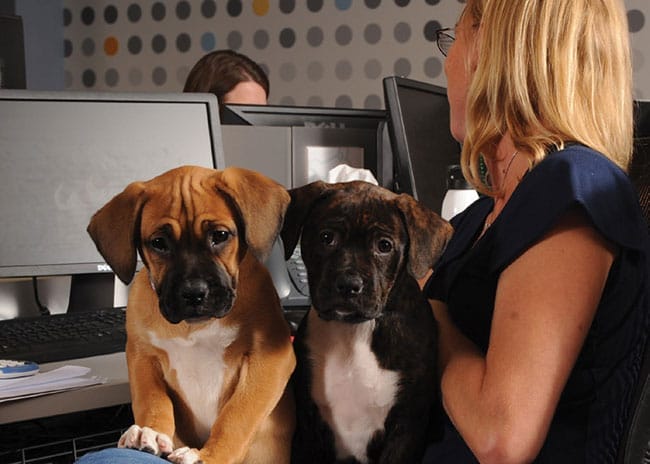The night before an accounting midterm exam in 2001, Wharton MBA candidates Chris and Natasha Ashton (both WG03) found themselves in the emergency room of the Matthew J. Ryan Veterinary Hospital at the University of Pennsylvania. Their 1-year-old cat, Bodey, had stopped eating and lost a lot of weight, getting progressively sicker and weaker. Their regular vet had run out of ideas, and the Ashtons were desperate to find out what was wrong.

Natasha and Chris Ashton, co-founders of Petplan, with an important company stakeholder, Dog in Chief Montgomery. Photo credit: Susan Farley.
A feeding tube, an infection from the feeding tube and a bout with pneumonia later, the Ashtons faced $5,000 in vet bills, which the married, full-time students could ill afford, recalls Natasha. Worse still, Bodey wasn’t improving. That is, until a Penn vet theorized the cat became severely constipated when the Ashtons changed her food to an anti-hairball diet. When they switched her food back, Bodey started eating again.
“It was a $5,000 laxative, essentially,” Natasha says wryly.
The frightening and expensive experience impressed upon the Ashtons that cat and dog owners in the United States had very limited options when it came to funding pet health care. In their native England, about 20 percent of the country’s cats and dogs were insured in 2001, with about 30 percent insured today, estimates Chris. In the United States, that figure was 0.65 percent in 2012, according to the North American Pet Health Insurance Association (NAPHIA).
The Ashtons teamed up with WG03 classmates Laura Bennett and Alex Krooglik to develop a business plan for a pet insurance company, for which they won the Wharton Business Plan Competition in 2003.
The team parted ways after graduation. The Ashtons launched Petplan Pet Insurance in Philadelphia, while Bennett and Krooglik co-founded Embrace Pet Insurance in Cleveland.
It appears the pet care market can support both. The space is booming in the U.S. More than 36 percent of all households include at least one dog and approximately 30 percent of households include an average of two cats, or nearly 70 million dogs and more than 74 million cats, according to the American Veterinary Medical Association (AVMA). Americans are also spending more than ever on their pets, says the American Pet Products Association, which forecasted that pet owners will have spent $58.5 billion on food, supplies, vet care, services such as grooming and boarding, and the purchase of animals in 2014, up from $55.7 billion in 2013.
Wharton graduates are capitalizing on these trends. From becoming leaders in the pet insurance industry like the Ashtons, Bennett and Krooglik, to guiding the way people take care of their pets, graduates are helping pet owners be the most loving, responsible and fun owners they can be.
Friendly Competition
For Petplan and Embrace, educating an American public about the benefits of pet-specific insurance remains one of the biggest challenges.
“We need a lot more competitors out there. Competition is good because it generates awareness, especially in a country this vast,” says Natasha Ashton, who now serves as Petplan’s chief marketing officer.
“The more people shouting about it, the better,” agrees Bennett.
One in three pets will be the subject of an unexpected vet bill each year, which can cost a pet owner thousands of dollars, according to Natasha, citing pet insurance market research by Datamonitor. The most typical claims for cats and dogs involve gastrointestinal issues and ear infections, which generally cost between $400 and $500 to treat, says Chris, now Petplan’s president.
Then there are the totally unexpected, downright weird things that happen no matter how healthy the animal, he adds, like the dog that had a cactus needle enter the back of its head and eventually migrate out through its eyeball or the cat that was impaled when a ceremonial sword fell off a wall. (Amazingly, both animals survived. Bodey, by the way, survived her bout with constipation and lived happily to age 11, when she died from unrelated kidney failure.)

Alex Krooglik and Laura Bennett, co-founders of Embrace Pet Insurance, have a paw up on the competition. Photo credit: Todd Biss.
Strategic partnerships have helped both Petplan and Embrace become important players in a small industry with a large potential customer base. The two pet insurance providers are among only 11 such companies in the U.S., according to NAPHIA; in comparison, about 80 companies serve the much smaller United Kingdom market, notes Natasha.
To gain instant credibility in the U.S. market, the Ashtons partnered with Petplan Ltd., a 35-year-old pet insurance company in the U.K., to exclusively license its brand for the U.S. The U.K. pet insurance industry offers a simple, comprehensive product, while U.S. pet insurance policies tend to be more complex and restrictive because they’ve been modeled on human health insurance policies, Natasha explains.
Petplan administers policies issued by AGCS Marine Insurance Co. in the U.S. Petplan differentiated itself by introducing the first customizable pet insurance policies, allowing “pet parents” to choose a premium and coverage that suits their needs and budget. All of its policies provide full coverage for accidents and illnesses, including hereditary and congenital conditions, from arthritis to zinc poisoning, for pets of any age, and are backed by 24/7 customer service.
Currently, Petplan manages 150,000 policies and has 130 employees at its office in Newtown Square, Pa.
“I don’t think we’d be where we are today if not for the support we received from the School as a whole and through the network,” says Natasha. The Ashtons’ Wharton connections resulted in Commerce Bank Founder Vernon W. Hill W67 becoming Petplan’s chairman of the board and an investor in the company.
For Bennett, Wharton presented the opportunity to reinvent herself and start her own company. As an actuary, Bennett brought much-needed insurance knowledge to the team that comprised the Ashtons and Krooglik before they parted ways.
“I was the only insurance person in the whole class,” Bennett remembers.
Embrace has nearly 60 employees in Cleveland and manages 40,000 policies. Embrace found a home in Cleveland because that’s where Bennett’s husband, and for a time Krooglik, worked at Progressive Insurance. Bennett’s cat, Lily, now age 9, was the first pet covered by an Embrace policy.
Its policies are issued by American Modern Home Insurance Co. and include accident and illness coverage with an optional additional annual allowance of $200 to $400 for routine care. Cats and dogs aged 14 years and younger are eligible for accident, illness and wellness coverage (older pets can get accident and wellness coverage), which cannot be dropped or changed by Embrace as the pet ages. Embrace coverage includes breedspecific conditions, cancer treatment, diagnostic testing, surgery and alternative therapies, and can exclude pre-existing conditions, cosmetic procedures, organ transplants and prosthetic limbs.
Training Pet Owners
One of the contributors to Embrace’s blog is Dr. Patty Khuly V95 WG97 of Miami, a veterinarian who has spread the word about pet health issues virtually across multiple platforms since blogging began. The social media-savvy veterinarian, blogger and app designer takes an entrepreneurial approach to her medical career, leveraging her love of writing and pets to make a name for herself. Khuly launched her own blog, www.Doolittler.com, in 2005, which led to a pet health column for the Miami Herald and blogging for Vetstreet.com, among other websites and publications.

Dr. Patty Khuly, the Miami vet who has collared the online pet health content market. Photo credit: Jeffrey Salter.
“It keeps me in the mix and keeps me relevant. Without the writing, I couldn’t get other gigs,” Khuly explains. She says the increased attention she’s received from her writing has led to roles on corporate advisory boards and veterinary task forces, among other opportunities.
Khuly uses her pet health knowledge and influence to speak out against cosmetic procedures such as declawing in cats, docked tails in dogs and breeding for exaggerated traits. She also advocates against animal obesity, an all-too-common problem for owners who can’t say no to their pet’s pleading eyes.
In January 2013, Khuly ventured into yet another arena by launching an iPhone app, The Fat Dog Diet, and a corresponding website, www.drpattykhuly.com, to provide individualized guidance to help slim down an overweight pet. Excess weight is one of the most significant and prevalent health issues for companion animals, she notes. Additional pet health-related apps are in the pipeline.
Meanwhile, Khuly practices full time as a veterinarian at the Sunset Animal Clinic in Miami (which she also is in the process of rehabbing and moving).
“Refusing to stay still is kind of a pathology among us,” she jokes.
The U.S. is hardly the only country that’s crazy about its pets, and alumni are also pioneering new health and retail services outside the U.S., serving burgeoning pet industries in such places as India and Mexico.
Out of the Basement in India
Rahul Jetley WG10, formerly an associate principal at Jacob Ballas Capital India Private Ltd. in New Delhi, spent most of his career in finance. He decided to attend Wharton so he could start his own business and grow as a well-rounded business professional. Jetley says he also wanted experience navigating the obstacles faced by business owners in India, including the “shoddy infrastructure, corruption and crippling bureaucracy” he observed while living and working in the country.
When Jetley returned to India, he set his sights on launching a business in a consumer-facing animal health care niche with no organized players: a veterinary hospital with satellite clinics. He also knew firsthand the dearth of quality competition.
“As a family, we have always had pets and had always been unhappy with the experience at our veterinary care providers,” Jetley says.
Most vets in India practice out of their basements, and hygiene standards tend to be low, Jetley points out.
“One of the ‘compliments’ we get at our hospital is that it does not smell like a veterinary clinic,” he adds.
In India, pet owners also face a lack of standard charges for veterinarian services and a lack of transparency in billing, not to mention “doctors” practicing without a veterinary license, Jetley says.
With an eye toward raising standards for care and customer service, Jetley and veterinarian Ramandeep Chaggar co-founded Alphapet in August 2013. The company consists of a main hospital in New Delhi and two smaller clinics within a 15-mile radius. They chose the hub-and-spoke business model for convenience because people generally don’t want to travel more than 20 minutes to go to the vet for wellness visits and vaccinations, he explains. The main hospital focuses on more serious health issues that require X-rays and surgeries. Alphapet has 14 employees and sees about 1,000 clients a month, Jetley says, and more hospitals and clinics are planned.
The pet industry in India is much smaller and less developed than in the U.S., but it’s expanding rapidly.
“People are now starting to view their pets as a family member, rather than just an animal, which generally remains outside of the house,” Jetley says, attributing this shift in attitudes to increased exposure to global trends and a growing affluence that allows people to spend more on their pets.
Unleashing Mexico Markets
In Mexico, 58 percent of Mexican families own pets, according to the country’s National Institute of Statistics and Geography, yet pet owners have few retail options. Toby Clarence-Smith and Pablo Pedrejon Garcia (both WG13) see this as an opportunity, and despite a Mexican startup scene that remains largely in its infancy, they launched a pet e-commerce website, Petsy, in March 2013. They were hoping to benefit from government economic reforms and a growing middle class and online shopping industry.
The recent grads took what they learned about e-commerce during their Wharton internships— Garcia in Seattle at Amazon.com and Clarence-Smith in Mexico City at the then-fledgling Linio, which has become Mexico’s largest e-commerce website.
Clarence-Smith recalls how he and Garcia had to do everything themselves in the beginning, from delivering orders—by bicycle when necessary—and packing boxes to learning basic programming to working on the website.
“Being a startup founder is not just about raising money and running meetings,” he says.
But the two soon moved on to delegating, managing a team and raising seed money. Just six months after Petsy’s launch, Venture Partners Mexico and others invested $1 million in the company, following on a year later with another $800,000. Petsy now employs 26 people at its Mexico City office.
On Nov. 12, Petsy was named “Site of the Year,” the grand prize in a contest for e-businesses sponsored by CNN Expansion, the cable news organization’s Spanish-language portal in Mexico, says Clarence-Smith. Petsy also won the consumer category of the countrywide competition, in which 110 companies competed.
Although the website offers a wide variety of pet products, Clarence-Smith says the best-selling item by far is premium dog and cat food.
Perhaps this global trend toward loving and pampering pets—even treating cats and dogs like children and spending indulgent amounts of money on them—can be explained by the aging population and declining birth rates worldwide, as did a report on global pet industry trends by market research provider Companiesandmarkets.com.
Whatever the reason, Wharton alumni are capitalizing. They are unleashing their entrepreneurial spirit and business acumen, whether by identifying and profiting from health care and product trends fueled by the booming number of pet owners in the U.S. or carving a niche in up-and-coming markets around the world.
—Samantha Drake CGS06 is a freelance writer in the Philadelphia area who specializes in business, legal and general interest stories.


























